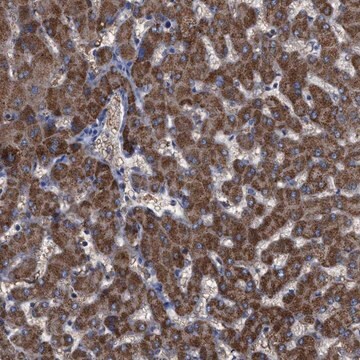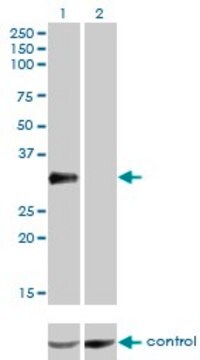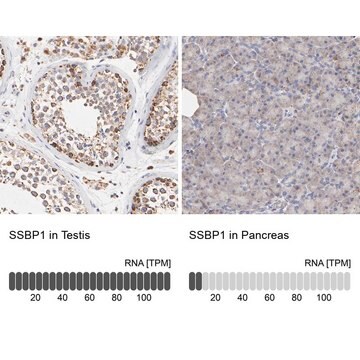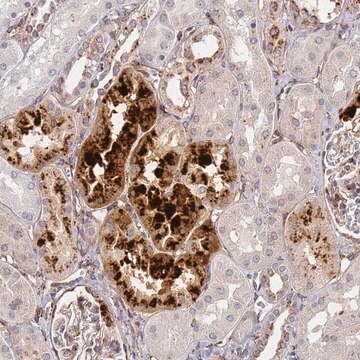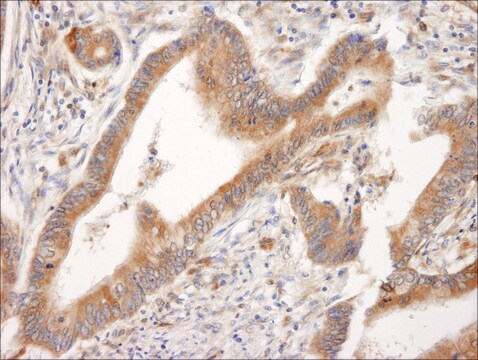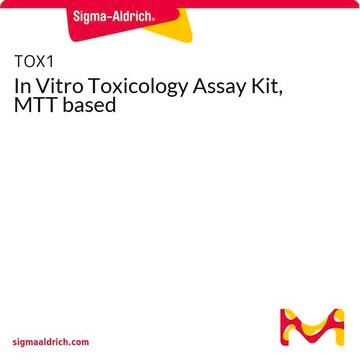推荐产品
生物源
rabbit
共軛
unconjugated
抗體表格
affinity isolated antibody
抗體產品種類
primary antibodies
無性繁殖
polyclonal
產品線
Prestige Antibodies® Powered by Atlas Antibodies
形狀
buffered aqueous glycerol solution
物種活性
human
技術
immunofluorescence: 0.25-2 μg/mL
immunohistochemistry: 1:50-1:200
免疫原序列
NPWFCDCHISKMIELSKVVDPAIVLLDPLMTCSEPERLTGILFQRAELEHCLKPSVMTSATKIMSALGSNVLLRCDATGFPTPQITWTRSDSSPVNYTVIQESPEEGVRWSIMSLTGISSKDAGDYKCKAKNLAGMSEAVV
UniProt登錄號
運輸包裝
wet ice
儲存溫度
−20°C
目標翻譯後修改
unmodified
基因資訊
human ... LRIT3(345193)
免疫原
Leucine-rich repeat, immunoglobulin-like domain and transmembrane domain-containing protein 3 recombinant protein epitope signature tag (PrEST)
應用
All Prestige Antibodies Powered by Atlas Antibodies are developed and validated by the Human Protein Atlas (HPA) project and as a result, are supported by the most extensive characterization in the industry.
The Human Protein Atlas project can be subdivided into three efforts: Human Tissue Atlas, Cancer Atlas, and Human Cell Atlas. The antibodies that have been generated in support of the Tissue and Cancer Atlas projects have been tested by immunohistochemistry against hundreds of normal and disease tissues and through the recent efforts of the Human Cell Atlas project, many have been characterized by immunofluorescence to map the human proteome not only at the tissue level but now at the subcellular level. These images and the collection of this vast data set can be viewed on the Human Protein Atlas (HPA) site by clicking on the Image Gallery link. We also provide Prestige Antibodies® protocols and other useful information.
The Human Protein Atlas project can be subdivided into three efforts: Human Tissue Atlas, Cancer Atlas, and Human Cell Atlas. The antibodies that have been generated in support of the Tissue and Cancer Atlas projects have been tested by immunohistochemistry against hundreds of normal and disease tissues and through the recent efforts of the Human Cell Atlas project, many have been characterized by immunofluorescence to map the human proteome not only at the tissue level but now at the subcellular level. These images and the collection of this vast data set can be viewed on the Human Protein Atlas (HPA) site by clicking on the Image Gallery link. We also provide Prestige Antibodies® protocols and other useful information.
生化/生理作用
LRIT3 (leucine-rich repeat, immunoglobulin-like and transmembrane domains 3) protein is involved in the regulation of fibroblast growth factor receptors (FGFRs). Mutations in this gene may result in congenital stationary night blindness, type 1F.
特點和優勢
Prestige Antibodies® are highly characterized and extensively validated antibodies with the added benefit of all available characterization data for each target being accessible via the Human Protein Atlas portal linked just below the product name at the top of this page. The uniqueness and low cross-reactivity of the Prestige Antibodies® to other proteins are due to a thorough selection of antigen regions, affinity purification, and stringent selection. Prestige antigen controls are available for every corresponding Prestige Antibody and can be found in the linkage section.
Every Prestige Antibody is tested in the following ways:
Every Prestige Antibody is tested in the following ways:
- IHC tissue array of 44 normal human tissues and 20 of the most common cancer type tissues.
- Protein array of 364 human recombinant protein fragments.
聯結
Corresponding Antigen APREST72328
外觀
Solution in phosphate-buffered saline, pH 7.2, containing 40% glycerol and 0.02% sodium azide
法律資訊
Prestige Antibodies is a registered trademark of Merck KGaA, Darmstadt, Germany
免責聲明
Unless otherwise stated in our catalog or other company documentation accompanying the product(s), our products are intended for research use only and are not to be used for any other purpose, which includes but is not limited to, unauthorized commercial uses, in vitro diagnostic uses, ex vivo or in vivo therapeutic uses or any type of consumption or application to humans or animals.
未找到合适的产品?
试试我们的产品选型工具.
儲存類別代碼
10 - Combustible liquids
水污染物質分類(WGK)
WGK 1
閃點(°F)
Not applicable
閃點(°C)
Not applicable
個人防護裝備
Eyeshields, Gloves, multi-purpose combination respirator cartridge (US)
Rueben G Das et al.
Scientific reports, 9(1), 14166-14166 (2019-10-04)
Congenital stationary night blindness (CSNB), in the complete form, is caused by dysfunctions in ON-bipolar cells (ON-BCs) which are secondary neurons of the retina. We describe the first disease causative variant associated with CSNB in the dog. A genome-wide association
Leucine-rich repeat, immunoglobulin-like and transmembrane domain 3 (LRIT3) is a modulator of FGFR1.
Sun-Don Kim et al.
FEBS letters, 586(10), 1516-1521 (2012-06-08)
Fibroblast growth factor receptors (FGFRs) play critical roles in craniofacial and skeletal development via multiple signaling pathways including MAPK, PI3K/AKT, and PLC-?. FGFR-mediated signaling is modulated by several regulators. Proteins with leucine-rich repeat (LRR) and/or immunoglobulin (IG) superfamily domains have
Christina Zeitz et al.
American journal of human genetics, 92(1), 67-75 (2012-12-19)
Congenital stationary night blindness (CSNB) is a clinically and genetically heterogeneous retinal disorder. Two forms can be distinguished clinically: complete CSNB (cCSNB) and incomplete CSNB. Individuals with cCSNB have visual impairment under low-light conditions and show a characteristic electroretinogram (ERG).
Keiko Miyadera et al.
Proceedings of the National Academy of Sciences of the United States of America, 119(13), e2117038119-e2117038119 (2022-03-23)
SignificanceCanine models of inherited retinal diseases have helped advance adeno-associated virus (AAV)-based gene therapies targeting specific cells in the outer retina for treating blinding diseases in patients. However, therapeutic targeting of diseases such as congenital stationary night blindness (CSNB) that
我们的科学家团队拥有各种研究领域经验,包括生命科学、材料科学、化学合成、色谱、分析及许多其他领域.
联系技术服务部门
